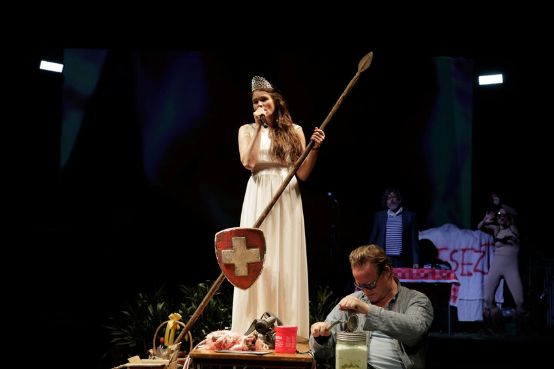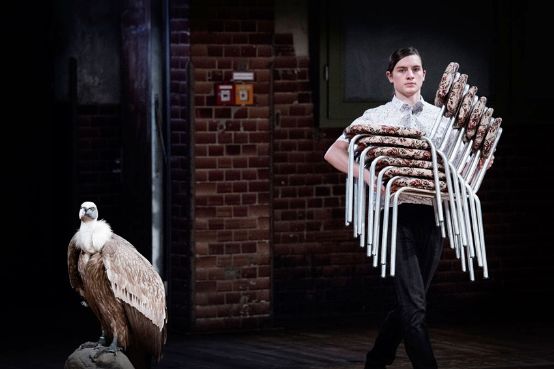National Opera" project in Berlin
On the day of the Brexit referendum of all days, the topic of national sentiment was the focus of an experimental evening of music theater at Berlin's Radialsystem.

Three groups of artists from Germany, Hungary and Switzerland each worked on an opera work representative of their country - if there is one. In the absence of such a work, the Swiss chose the Swiss Psalmthe Swiss Federal Charter and being Swiss in a rather rough and physical theatrical way. But first things first.
Distanced with "Freischütz"
The Berlin opera company Novoflot dedicated the first part to the "first German national opera", the Freischütz by Carl Maria von Weber (1786-1826). The romantic and dark story about the hereditary forester Kuno, the forester's daughter Agathe and the huntsman Max is staged according to the question: Which of them will win the race? Three little girls make notes on betting slips. A trombone choir plays noisy music using the mutes. A narrator comments on the sporting events while the singers run off, sing their arias, stumble and fall down dead.
Later, they take on the role of judges who assess the sporting performance. Meanwhile, an elegant young man with a pigtail, perhaps a young Karl Lagerfeld, sets up the typical German stage set. A stuffed eagle. A dartboard with a Nordic ship motif. A clothes horse, an empty fridge, a telephone box from Telekom.
In a reduced form, alternating between opera singing and actors' voices, the popular hits of the Freischütz is offered here, which is particularly captivating during a moment with the unusual combination of bass clarinet and melodica. The performance of the children's choir is a great moment, when the entire stage is suddenly filled with this multitude of girls' bodies and their delicate voices. And yet this Freischütz a little too long, too static and often too imprecise in timing and articulation. While Ännchen and Agathe rush busily from one side of the stage to the other, rummaging in cooler bags and singing incomprehensible things, you feel too much reminded of the usual opera productions and no longer realize that you are supposed to be in a special musical theatre experiment. And what was that about nationality? The question remains with this Freischütz strangely untouched.
-

"Freischütz" by the Berlin opera company Novoflot. Photo: Falko Siewert
Perplexed with Heidi
And now the Swiss Psalm of the Zurich theater group herb_production. Beer benches on the stage with green and red voting cards on them. Flower pots with hedge plants obscure the view. Raffle prizes are set up somewhere, the performers sit at another table and drink. The Swiss speak poor English at company meetings, you learn, and they are ashamed that they are doing so well, so they try not to attract attention. The screen shows commercials for Switzerland and for parties or people you could vote for.
The participatory theater begins, with a raffle and a ladies' choice. The two women, Wändy and Sändy, play silly sketches. The sound system, which is set far too loud, blares in your ears and the energy of this semi-improvised action theater doesn't really want to transfer. At some point, all the performers piss in a zinc gutter on stage. One of the performers insistently whines that she is Heidi and is now returning from Frankfurt to her grandfather. She allows herself to be milked with a milking machine and the breast milk is turned into butter, which the actors smear on each other's faces. Somehow it is also about the responsibility of the individual for the community, perhaps also for this theatrical situation. In all these Swiss clichés between Heidi, piss and milk, there is not much sign of a sense of community; it rather has the air of anger and self-loathing. The Berlin audience is left somewhat perplexed.
Touched together by "Bánk bán"
The production by the Hungarian group Krétakör. On stage is a border fence that falls right at the beginning, torn down by the actors together.
The many young people of Krétakör, who describe themselves as "activists" and not theater artists, deal with the opera in their play. Bánk bán* by composer Ferenc Erkel (1810-1893), which tells the story of the murder of Queen Gertrude by Hungarian noblemen in three acts. The performers don't need much to approach (and distance themselves from) each other. There is a pianist on stage with an electric piano who plays the music from the opera in a reduced version. The performers act out the scenes from the opera by adopting simple constellations and poses and reciting the texts in abridged form. For the German audience, the most important parts are summarized in English. In the background is a video screen on which historical photos, pictures with current references and film clips can be seen.
Based on the opera's plot, the activists draw parallels to current events in Hungary, from covered-up rapes at university and the unequal treatment of women to the exclusion of foreigners, mistrust of Europe as a foreign power and the stirring up of hatred by strengthening traditional national sentiment. Krétakör creates a much more beautiful version of a national opera by setting a piano version of Bánk bán A film showing the faces of very different people of different ages from today's Hungary. A simple means, but one that does not fail to have a touching and unifying effect.
Finally, the activists ask the audience questions, and although it is hot in the room and the evening is already well advanced, the audience gradually begins to open up to these young people and answer the questions. What you would do if you were the mayor of this city. Whether artists are actually important for society. If there is a secret ingredient for communities, what it is. The Krétakör activists ask their questions respectfully, vulnerably and seriously, creating an atmosphere in which something of the sought-after community can be felt - and of the responsibility of the individual. As a delicate little plant, as a possible utopia, far removed from any sense of nationalism.
* The German title of the opera is: Banus Bánk. Banus is the name for a rich gentleman. The deputy of the Hungarian king is called Bánk in the opera.








